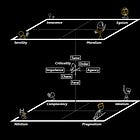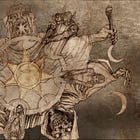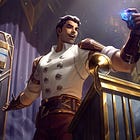8 | EGOISM : the Narcissist
Method & Madness | Book II : Archetypical Philosophies
The adventurer treats life like a game—a series of detached adventures—throwing himself into simple action while denying that any meaning or consequence can be tied to them. He seeks only the intensity of experience, refusing to accept that his freedom is intertwined with other people’s.
—S. de Beauvoir (ab. M. Hise)
The narcissist seeks to perfect her self-image, living the perpetual anxiety of its maintenance. Her relationships lack genuine connection—she keeps them only for validation. Through this, she believes she is achieving independence—in reality, she only builds herself a more beautiful prison.
—S. de Beauvoir (ab. M. Hise)
A brilliant bard stands upon a stage, regaling a crowd with his songs—spinning tales of wild fiction and the most bewitching fantasy. A dancer moves with poise and grace, bells clinking as she steps to time—the curves of her body drawing spellbound gaze from prince and pauper alike. These players endeavor to win hearts and minds—to capture the attention of one and all, and to soar upon the praise and worship of a roaring crowd.
This is the Egoist, who holds in his grasp the subtle strength of fiction—who would weave a story about himself to draw disciples to adoration. She seeks adulation: the Power to assert ownership over the Agency of admirers—those who’d willingly devote their lives to the worship of a fleeting preoccupation.
Thus, the Egoist is the Narcissist: he who believes himself imbued with an inherent value—that he deserves to inhabit a reality which is Ordered to his benefit. Seeing himself as entitled to be the focus of his own story, the Egoist is quick to assume that when things don’t go his way, the fault lies not with him… but instead, with someone else. His assessment of reality is never mistaken—his opinions and beliefs not necessary to test against the world of reality. Instead, it’s the world which must be flawed… and thus, the world which must be corrected—realigned to Order, and the proper state-of-things:
The one which affirms his inherent value.
And so, the Egoist is the one who believes that there are two kinds of people in this world:
The delightful, and the banal.
There are things in this world which one wants and possesses—playthings which amuse and companions who fascinate. Then, there are things in this world which are boring—trinkets and baubles and dull, humdrum people which have either grown tiresome or were always unappealing.
The Egoist sees himself as Adept, and so styles himself as a Pragmatist—as someone who’s just as Powerful and worthy of praise as the master of Eden. He sees himself as the hero—as the focus of his own dramatic adventure—and thus, enables himself to believe that he is in control: that he commands full authorship over his own life and Agency. Thus, he asserts himself in the world as his own style of master—not of Eden and its mighty walls… but instead, of his own destiny.
This adventurer-hero is the Egoist’s fantasy—an imagination of himself as the leading-man in his own fiction; the protagonist at the center of a world built for the purpose of his enjoyment. Thus is his world composed of playthings either delightful or banal—of people which enhance one’s quality-of-adventure… and people which degrade it; and which, therefore, one might as well discard for the sake of better adventure.
The Servile’s eyes crave the Pragmatist’s riches—the Moralist’s mind seeks to own his Power. The Egoist’s heart covets neither of these—but instead, is enamored with his glory: the praise and worship which is willingly given to one who achieves great feats of Agency.
Thus knowing that the Pragmatist-king has won the prize of adulation by building great things, the Egoist sets out to do the same—that is, to do great things. He does them, however, not because he deems those things to be useful or necessary… but instead, only to win the approval of peers and lesser men1. He seeks the acknowledgement of his value in order to confirm his deepest conviction: that he is, in truth, the most Powerful and capable—
That he deserves to be the Egoist-king.
Philosophy: a mindset. a worldview. The way that one chooses to see the world, and thus approach living one’s life.
Αρχή | archí: origin
Τύπος | týpos: form
An Archetypical Philosophy is the logical basis of a person’s attitude, derived from observation of how he-or-she chooses to exist.
The Narcissist does not believe that there are people who are better than they. Instead, they believe themselves to be already the best—and so, when they encounter Others who are blatantly superior, they immediately elevate themselves to peerage, allowing them to consider themselves as at-least-equal to the best; at least… for now.

















